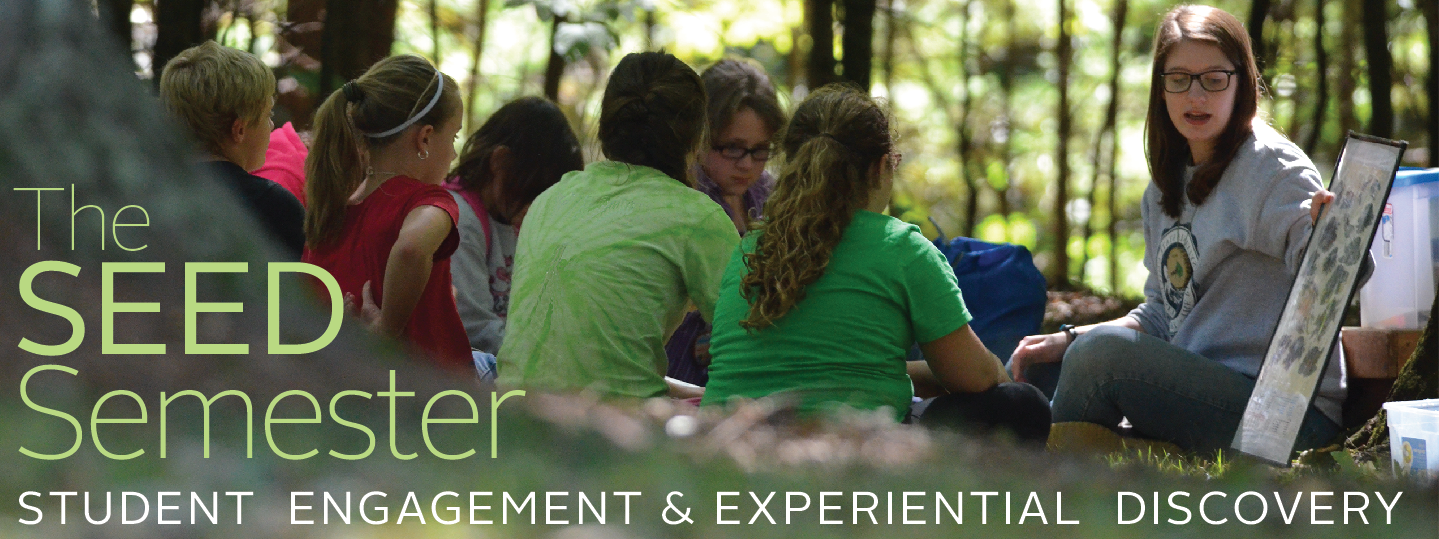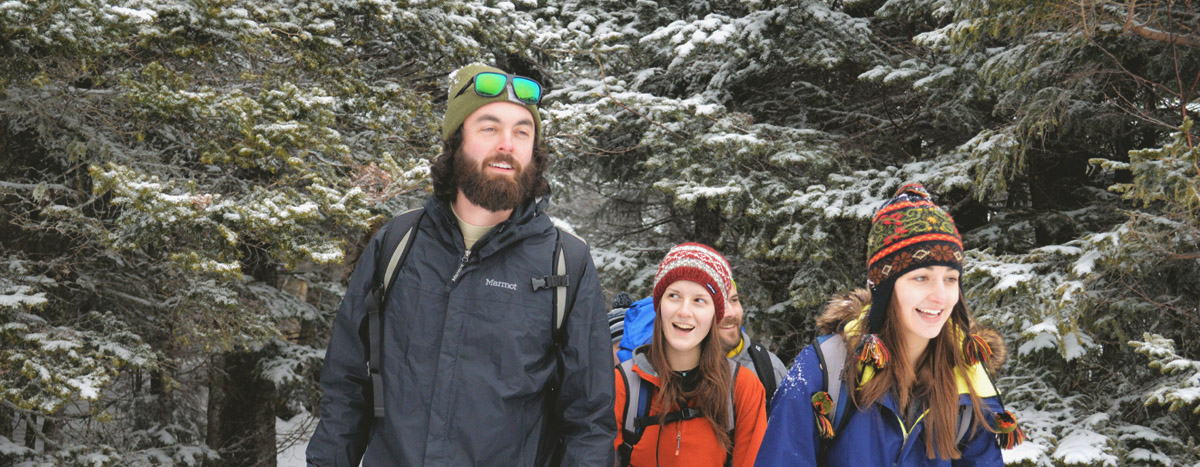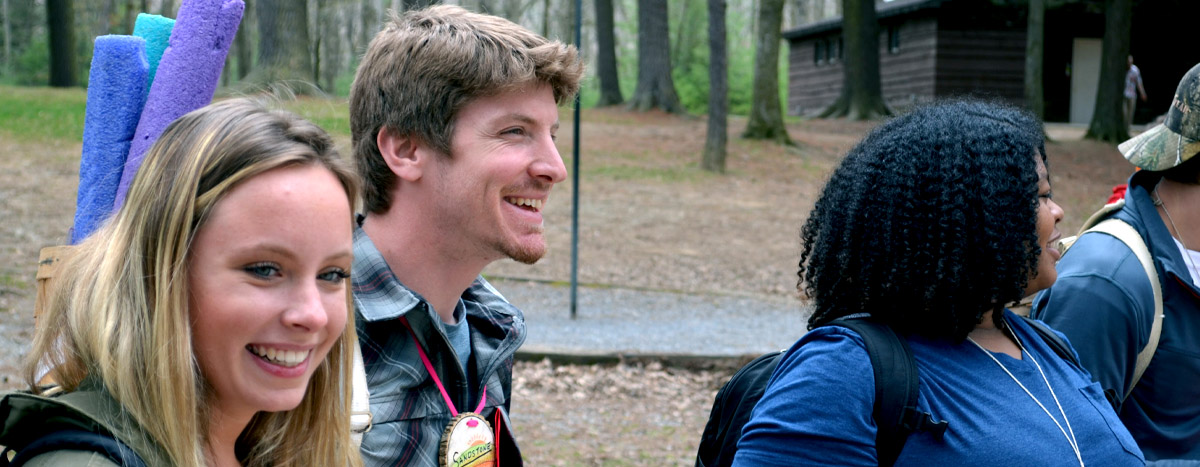
Your Spring Semester at Shaver’s Creek!
Get outside and off campus for your spring semester! The forests, fields, and creeks of Penn State’s outdoor education field lab, Shaver’s Creek Environmental Center, become your classroom for this full-semester experiential journey of outdoor leadership and environmental interpretation courses. The SEED Semester (previously called the Discovery, or “Block” Semester) has been providing transformative engaged scholarship experiences for Penn State students since 1979. Graduates of the program have gone on to work as park naturalists, environmental educators, corporate team building facilitators, high ropes course instructors, classroom teachers, park researchers and managers, and university faculty. You’ll spend your days with like-minded classmates engaging in real world, hands-on experiences teaching children and families about the natural world. You will work side-by-side with our experienced outdoor educators, team building facilitators, and naturalists to gain a holistic set of outdoor leadership skills.
When is the next SEED Semester?
The SEED Semester is appropriate for students interested in:
- Recreation, Parks, and Tourism Management (RPTM) major or minor — Park Management & Environmental Interpretation (PMEI) track
- Agricultural and Extension Education (AEE).
- Environmental Resource Management (ERM) major
- Community, Environment, Development (CED) major
- Wildlife and Fisheries science (WFS) major
- Science Education (SCIED) major
- environmental and outdoor education
- outdoor/environmental/adventure careers
- spending a semester at Shaver’s Creek!
The Experience
The SEED experience features engagement and connection activities that weave together the fabric of each course’s content for a truly unique semester. There will be opportunities for self-reflection and both personal and professional growth through journaling and solo time. By connecting with other SEED students and the faculty, you’ll help create a healthy and accepting learning community. Throughout the semester, SEED students will connect with several other nationally recognized outdoor and environmental education-based institutions via the discovery trip and class excursions. (see below for more details!).
The Classes
The Shaver’s Creek SEED Semester includes the following courses, taught as one unit, plus frequent visits to organizations and individuals doing exemplary work in the fields of environmental education, outdoor recreation, park management, and interpretation. SEED is a required component of Recreation, Park, and Tourism Management’s Park Management and Environmental Interpretation (PMEI) track, as the classes offered below are essential to its study. The SEED experience and classes are taught at Shaver’s Creek on Tuesdays and Thursdays from 9:00 a.m. — 5:00 p.m.
RPTM 326 — Natural History Interpretation
3 credits
Develop methods, techniques, and resources to acquire knowledge of natural history and share it with others. Field identification, projects of an applied nature, and seasonal application.
Prerequisite: RPTM 325
RPTM 425 — Principles of Interpretive Materials
3 credits
Learn principles, practices, and application of nonpersonal interpretive activities common to natural/cultural history, including exhibits, and audiovisual and illustrative materials.
Prerequisite: RPTM 325
RPTM 430 — Environmental Education Methods and Materials
3 credits
Discover methods and materials for developing, implementing, and evaluating environmental education programs in formal and nonformal educational settings.
This course also counts towards the Intercollege Minor in Sustainability Leadership.
Prerequisite: RPTM 325
RPTM 470 — Recreation and Park Management
3 credits
Understand management and administration procedures essential to park facilities and recreation programs.
Prerequisite: RPTM 320
A note on prerequisites: RPTM 320 and RPTM 325 are the prerequisites for the SEED Semester because they provide a strong foundation on which the curriculum is built; however, students who are unable to schedule these courses should contact Patty Kleban at plk4@psu.edu to discuss possible alternatives to prepare for the SEED Semester.
Excursions
Early on in the semester, SEED students will have the opportunity to participate in the discovery trip; an integral and immersive adventure that gives students an opportunity to travel out of state to exemplary outdoor and environmental centers. The immersive nature of this trip helps to build community and creates the intensive group experience that so often defines work in the outdoor profession. The experiential nature of the trip serves as a crucible for accelerating personal and professional growth and helps students to connect with the people who operate the professionally well-regarded parks, centers, and environmental education programs that we will visit.
Potential site visits could include: The Hulbert Outdoor Center, the Appalachian Mountain Club, Montshire Museum of Science, Marsh-Billings-Rockefeller National Historic Park, Wellfleet Bay Sanctuary, Tin Mountain Conservation Center, Gettysburg National Battlefield, Harpers Ferry Interpretive Design Center, Powdermill Nature Reserve, and Carnegie Science Center.
In addition, as the semester progresses you will have the opportunity to continue learning and connecting course content through visits to local resources such as the Pasto Agricultural Museum, Huntingdon Conservation District, Lake Raystown, and Rothrock State Forest.


